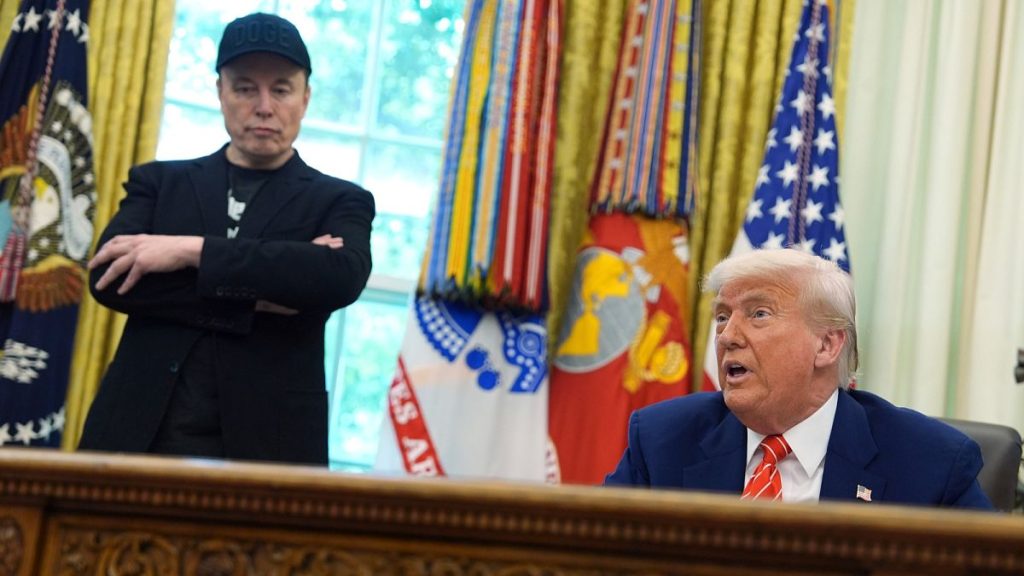The ongoing rivalry between US President Donald Trump and tech billionaire Elon Musk has dramatically escalated, with Musk hinting at the formation of a new political party in response to Trump’s recent remarks. Tensions between the two figures have surged as Musk criticizes Trump’s fiscal policies while Trump threatens Musk’s financial interests, suggesting that his companies could face substantial losses in government subsidies. This intense feud marks a significant evolution in their past political alliance, leaving many to wonder how their actions will impact the future political landscape.
| Article Subheadings |
|---|
| 1) Recent Developments in the Trump-Musk Feud |
| 2) Musk’s Critique of Trump’s Fiscal Policies |
| 3) The Potential Formation of the “America Party” |
| 4) Trump’s Response to Musk’s Threats |
| 5) The Impact on Future Political Alliances |
Recent Developments in the Trump-Musk Feud
The feud between Donald Trump and Elon Musk reignited on Tuesday, igniting the political scene with threats and accusations. Following a month of silence since their earlier verbal altercations, the two have found themselves at odds once again. Musk has criticized Trump’s recent tax cuts and fiscal policies, marking a shift from their previously comfortable political alliance, indicating that Musk is now willing to publicly distance himself from the former president. This renewed hostility appears to be fueled by Musk’s increasing dissatisfaction with Trump’s policies and their implications for American fiscal health.
Musk’s Critique of Trump’s Fiscal Policies
Elon Musk, known for his outspoken nature, did not shy away from dismantling Trump’s fiscal approach. He has referred to the tax cuts and spending bill as a form of “political suicide,” showcasing his disagreement with the Republican Party’s stance. Musk’s background as a former head of the Department of Government Efficiency (DOGE), which aimed to cut government spending, influences his criticism. Describing the GOP as the “Porky Pig party,” Musk argues that the party’s financial decisions are contrary to the interests of the public and would ultimately hurt the economy. This critique demonstrates his transition from an ally to a critic, suggesting that Musk may be taking a more independent political stance.
The Potential Formation of the “America Party”
In a surprising turn of events, Musk has floated the idea of establishing a new political party named the “America Party.” He argues that the current political system, characterized by the Democrat-Republican dynamic, is failing to represent the voices of the American people. Musk’s acknowledgment of a potential shift in political allegiance highlights a desire for change amid dissatisfaction with the status quo. His declaration on social media platforms has ignited discussions about alternative political movements, suggesting that his influence might extend beyond the corporate world and into the realm of politics.
Trump’s Response to Musk’s Threats
In response to Musk’s threats and criticisms, President Trump has issued sharp warnings about the consequences Musk may face regarding his business interests. Trump stated that Musk’s companies could lose billions in government subsidies if the criticisms continue. He cautioned that without these subsidies, Musk might struggle to maintain his operations in the United States. This assertion signifies Trump’s combative stance and his willingness to leverage governmental power against Musk’s business empire, demonstrating the intensive nature of their conflict.
The Impact on Future Political Alliances
The ongoing feud between Trump and Musk raises questions about the future of political alliances in the United States. Historically, Musk has played a significant role in supporting Trump’s campaigns, and this new rift could indicate a larger trend among influential individuals who are willing to challenge political norms. As Musk threatens to create an alternative to the current political landscape, observers are left to ponder whether new political movements will arise from these tensions, potentially reshaping electoral outcomes in the coming years. This situation embodies the evolving dynamics of political support in the age of social media, where public affiliations can shift rapidly and unexpected alliances may form.
| No. | Key Points |
|---|---|
| 1 | The feud between Trump and Musk has escalated dramatically with significant political implications. |
| 2 | Musk has publicly criticized Trump’s fiscal policies, calling them politically detrimental. |
| 3 | Musk proposed the formation of a new political party in response to dissatisfaction with existing options. |
| 4 | Trump has threatened Musk with the loss of federal subsidies for his enterprises. |
| 5 | The conflict signals possible shifts in political allegiances within the influential tech community. |
Summary
The renewed hostilities between President Donald Trump and Elon Musk exemplify the volatile nature of contemporary political alliances. As Musk openly criticizes Trump’s fiscal policies and hints at creating a new political party, the implications for future political dynamics become apparent. This unfolding drama raises essential questions about representation and the potential for new movements within the American political landscape, underscoring the risks and rewards inherent in the intersection of business and politics.
Frequently Asked Questions
Question: What triggered the recent feud between Trump and Musk?
The feud reignited following Musk’s public criticism of Trump’s tax cuts and spending bill, leading to a series of threats and warnings exchanged between the two.
Question: What does Musk propose in response to the current political landscape?
Musk has suggested the formation of a new political party, named the “America Party,” aimed at providing an alternative to the current Democrat-Republican system.
Question: How has Trump responded to Musk’s criticisms?
Trump has warned that Musk could face substantial financial repercussions, including the loss of government subsidies for his companies, if Musk continues his critical stance.


